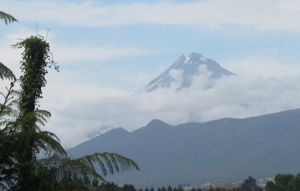 We received the very sad news on Monday 13 November that Rangikotuku had passed away.
We received the very sad news on Monday 13 November that Rangikotuku had passed away.
Rangikotuku Rukuwai lived in New Plymouth with his awesome wife, Ngaraiti. Rangikotuku was the inspiration for the book written about his great-grandfather, Te Whiti O Rongomai, which was published in 2015.
Rangikotuku was born in 1927 and was raised at Parihaka, amongst the families of Tohu Kakahi who was Te Whiti’s revered partner during the struggles which began in the 1860s. Rangikotuku and Ngaraiti were married at Pungarehu and lived for a time in the back of the Pungarehu Dairy factory.
 Strangely enough, at the same time as Rangikotuku and Ngaraiti were living there, Danny Keenan (author of the book) was living a few houses away, thō at the time he was only a pre-schooler.
Strangely enough, at the same time as Rangikotuku and Ngaraiti were living there, Danny Keenan (author of the book) was living a few houses away, thō at the time he was only a pre-schooler.
Rangikotuku was a quiet and gentle soul, a deeply cultural and intellectual person who nonetheless spoke simply, an awesome and loving person who always stayed true to the lessons of his upbringing.
One day, when we were walking around Parihaka, the question came up, why are we writing this book? So many fine books, articles and monographs had already been written, some by Māori. Rangikotuku said it was because the story of Parihaka needed to be told.
 Times were changing, he said. We were now living in a different age, when our Claims were being settled and our people were moving forward with economic development, papakāinga empowerment and cultural rejuvenation.
Times were changing, he said. We were now living in a different age, when our Claims were being settled and our people were moving forward with economic development, papakāinga empowerment and cultural rejuvenation.
But our young people were coming home, and, in this new world, they were wanting to know their stories. This was why the book needed to be written, he said.
Rangikotuku talked about his upbringing, at Parihaka and for a time, living down on Pungarehu beach. All of the old people he had known were alive within living memories. The legacy of Parihaka and Te Whiti O Rongomai had always remained central to these lived memories, and to his lifetime of so many experiences.
 In the end, Te Whiti had always talked about peace and unity, said Rangikotuku. His teaching was about his people, and all peoples, living this way. And that was Te Whiti’s legacy, he said.
In the end, Te Whiti had always talked about peace and unity, said Rangikotuku. His teaching was about his people, and all peoples, living this way. And that was Te Whiti’s legacy, he said.
It was also the legacy of Rangikotuku.
![]()
